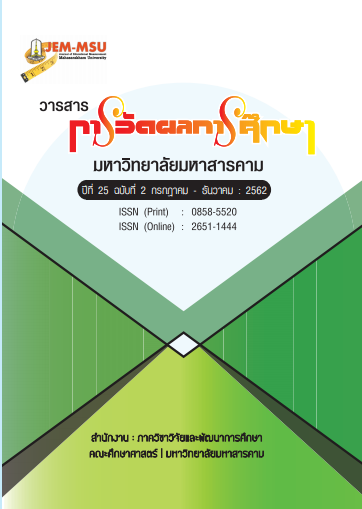Development of Indicators for Mathematical Habits of Mind of Upper Secondary Education Students
Main Article Content
Abstract
The purposes of this research were: 1) to develop indicators for mathematical habits of minds of upper secondary education students; 2) to analyze the model of mathematical habits of minds of upper secondary education students. The sample was divided into 2 groups: group 1 consisted of 847 upper secondary education students in Buriram Province, who were to be the subjects in the exploratory factor analysis (EFA), obtained through stratified random sampling; group 2 consisted of 1,241 upper secondary education students in Buriram Province, who were to be the subjects in the confirmatory factor analysis (CFA), obtained through stratified random sampling. The instruments comprised: 1) a structured interview form, 2) a rating scale questionnaire. The analysis of data employed the mean, standard deviation, correlation coefficient and factor analysis.
The findings of this research were as follows: 1) The indicators for mathematical habits of minds of upper secondary education students composed of 9 components and 60 indicators; 2) the analysis of the model of mathematical habits of minds of upper secondary education students revealed that the construct model was in congruence with the empirical data. The goodness of fit index showed the following summation between the model and the empirical data: chi - square (x2) of 1602.43, degrees of freedom (df) = 1531, p = 0.0645, GFI = 0.958, CFI = 0.999, AGFI = 0.950, SRMR = 0.0356 and RMSEA = 0.00669. The factor loadings were sorted in descending order as follows: questioning and posing doubts, having curiosity, having mathematical process skills, striving for accuracy, having thinking flexibly, having responsibility for one’s own decisions, thinking about thinking, having persistence, and having knowledge in mathematics content, with the factor loading values of 0.923, 0.918, 0.913, 0.908, 0.907, 0.778, 0.733 and 0.564 respectively.
Article Details
The content and information contained in the published article in the Journal of Educational Measurement Mahasarakham University represent the opinions and responsibilities of the authors directly. The editorial board of the journal is not necessarily in agreement with or responsible for any of the content.
The articles, data, content, images, etc. that have been published in the Journal of Educational Measurement Mahasarakham University are copyrighted by the journal. If any individual or organization wishes to reproduce or perform any actions involving the entirety or any part of the content, they must obtain written permission from the Journal of Educational Measurement Mahasarakham University.
References
กระทรวงศึกษาธิการ. (2551). หลักสูตรแกนกลางการศึกษาขั้นพื้นฐาน พุทธศักราช 2551. สืบค้นจาก https://math.ipst.ac.th/wp-content/uploads/2015/PDF/Curriculum%202551.pdf
ชมนาด เชื้อสุวรรณทวี. (2555) การพัฒนารูปแบบการเรียนการสอนคณิตศาสตร์เพื่อส่งเสริมความสามารถใน การคิดขั้นสูงและจิตนิสัยของนักเรียนในระดับชั้นมัธยมศึกษาตอนปลาย. ปริญญานิพนธ์ ปร.ด. (หลักสูตรและการสอน). กรุงเทพมหานคร: บัณฑิตมหาวิทยาลัยศิลปากร.
พงศธร มหาวิจิตร และสุนทรีย์ ปาลวัฒน์ชัย. (2561). การพัฒนาชุดกิจกรรมคณิตศาสตร์เพื่อเสริมสร้าง ความสามารถในการแก้ปัญหาอย่างมีจิตนิสัยทางคณิตศาสตร์ สำหรับนักเรียนระดับชั้นประถมศึกษา ปีที่ 6 โรงเรียนสาธิตแห่งมหาวิทยาลัยเกษตรศาสตร์ศูนย์วิจัยและพัฒนาการศึกษา. วารสารปัญญา ภิวัฒน์, 10(1) ประจำเดือนมกราคม – เมษายน.
วิทยา นาควัชระ. (2545). คนนิสัยดี. กรุงเทพฯ : บริษัทอัมรินทร์พริ้นติ้งแอนพับลิสชิ่ง จำกัด (มหาชน).
วรรณี โสมประยูร. (2541). การวิจัยและพัฒนารูปแบบการสอนและสื่อการสอนคณิตศาสตร์ ระดับ ประถมศึกษา. กรุงเทพฯ : คณะศึกษาศาสตร์มหาวิทยาลัยศรีนครินทรวิโรฒ.
สถาบันส่งเสริมการสอนวิทยาศาสตร์และเทคโนโลยี. (2561). คู่มือการใช้หลักสูตรกลุ่มสาระการเรียนรู้ คณิตศาสตร์ระดับมัธยมศึกษาตอนปลาย (ฉบับปรับปรุง พ.ศ. 2560). สืบค้นจาก https://www.scimath.org/e-books/8379/8379.pdf.
สำนักงานคณะกรรมการการศึกษาขั้นพื้นฐาน. (2553). ROADMAP จุดเน้นสู่การพัฒนาคุณภาพผู้เรียนเพื่อการ ขับเคลื่อนหลักสูตรการจัดการเรียนรู้การวัดผลและประเมินผล. กรุงเทพฯ: โรงพิมพ์ชุมนุมสหกรณ์ การเกษตรแห่งประเทศไทย.
สำนักงานเลขาธิการสภาการศึกษา. (2553). แผนการศึกษาแห่งชาติ ฉบับปรับปรุง (พ.ศ. 2552-2559) : ฉบับ สรุป. สืบค้นเมื่อ 12 พฤศจิกายน 2560, จาก http : //www.onec.go.th/onec_adminitstrator /uploads/Book/698-file.pdf
สุรางค์ โคว์ตระกูล. (2553). จิตวิทยาการศึกษา. พิมพ์ครั้งที่ 9. กรุงเทพฯ : สำนักพิมพ์แห่งจุฬาลงกรณ์ มหาวิทยาลัย.
อุษณีย์ โพธิสุข. (2537). การพัฒนาความสามารถพิเศษทางวิทยาศาสตร์และคณิตศาสตร์ของเด็กและเยาวชน. หน้า 32 – 53. กรุงเทพมหานคร.
Common Core State Standards Initiative. (2010). Common Core State Standards in Mathematics. Retrieved Desember 2, 2017, from https://www.corestandards.org /Math/Practice.
Covey, Stephen R. (2004). The 7 Habits of Hightly Effective People. New York : Simon and Schuster.
Costa, A.L. & Kallick, B. (2000). Discoverring and Exploring Habits of mind. Alexandia, VA : Assosiation for A supervision and curriculum Devenlopment.
Cuoco, A., Goldenberg, E.P., and Mark, J. (1996). Habits of mind: An organizing principle for a mathematics curriculum. Journal of Mathematical Behavior, 15 (4), 375-402. from https://www2.edc.org/cme/showcase/HabitsOfMind.pdf.
Cuoco, A., Goldenberg, E. P., & Mark, J. (2010). Contemporary curriculum issues: Organizing a curriculum around mathematical habits of mind. Mathematics Teacher, 103(9), 682- 688.
Driscoll, M., DiMatteo, R. W., Nikula, J. E., & Egan, M. (2007). Fostering geometric Thinking :
A guide for teachers grades 5-10. Portsmouth, NH : Heinemann.
Goldenberg, E. P., Shteingold, N., & Feurzeig, N. (2003). Mathematical habits of mind form young children. In F. K. Lester & R. I. Charles (Eds.), Teaching mathematics through problem solving: Prekindergarten - Grade 6 (pp. 15- 29). Reston, VA : National Council of Teachers of Mathematics.
Hair, J. F., Black,W. C.,Babin, B. J. & Anderson, R. E. (2010). Multivariate data analysis. 10th ed. NJ: Pearson Education inc.
Hull, T., Balka, Don, & Miles, R. H. (2012). Mathematical thinking and reasoning : Achieving the process standards. Texas Mathematics Teacher, 59 (2), 15-18.
Levasseur, K., & Cuoco, A. (2003). Mathematical habits of mind. In H. L. Schoen (Ed.), Teaching mathematics through problem solving: Grade 6-12 (pp. 23-37). Reston, VA: National Council of Teachers of Mathematics.
Lim, K. A Collection of Lists of Mathematical habits of Mind. (2013). from https://math. utep.edu/Faculty/kienlim/HoM_Collection.pdf
Marzano, R. J. (1992). A different kind of classroom: Teaching with Dimensions of Learning. Alexandria, VA: Association for Supervision and Curriculum Development.
National Council of Teachers of Mathematics (NCTM). (2000). Principles and standards for school mathematics. Reston, VA: Author.
National Council of Teachers of Mathematics (NCTM). (2009). Focus in High School Mathematics: Reasoning and Sense Making. Reston, VA: Author.
RAND Mathematics Study Panel. (2003). Mathematical proficiency for all students: Toward a strategic research and development program in mathematics education. Santa Monica, CA: RAND Corporation MR-1643.0-OERI.
Seaman, C. E., & Szydlik, J. E. (2007). Mathematical sophistication among preservice elementary teachers. Journal of Mathematics Teacher Education, 10, 167-182.
Seeley, C. L. (2014). Smarter Than We Think: More Messages About Math. USA : Scholastic.
Texas Education Agency (2012). Texas Administrative Code (TAC), Title 19, Part II Chapter 111. Texas Essential Knowledge and Skills for Mathematics. From https://ritter. tea.state.tx.us/rules/tac/chapter111/index.html.


